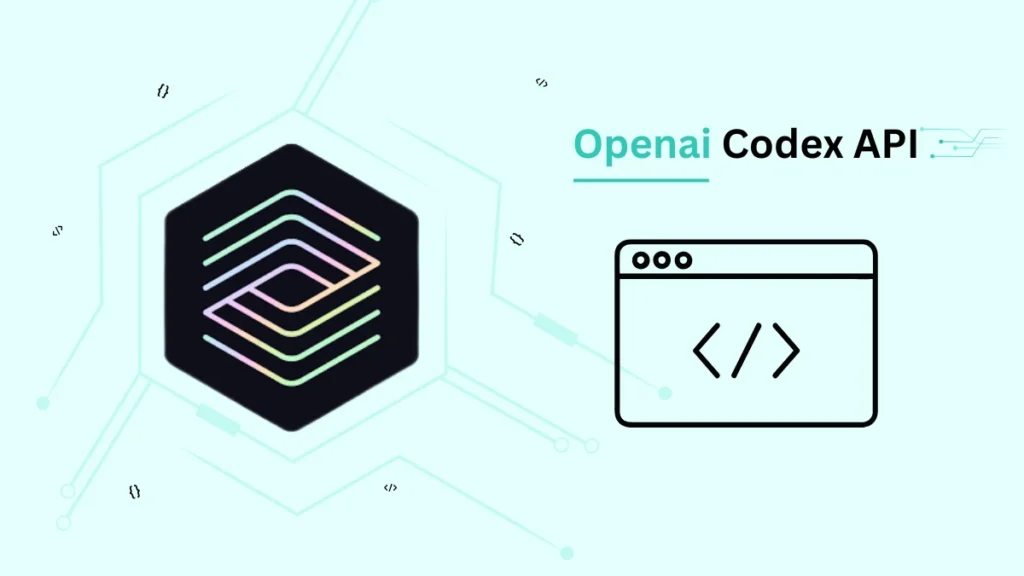Introduction
A brief overview of what OpenAI Codex is
Open AI Codex is a famous advanced artificial intelligence system that was developed by OpenAI. It can understand human text and also generate human-like text from natural language prompts. OpenAI Codex provides developers code suggestions, and code snippets. It can even finish or give an entire function or a module based on a simple prompt. It has a vast knowledge of programming, It knows Python, Javascript, Java, Ruby, Flutter, and more. This also makes this thing a very helpful tool for developers. Like in a real-world scenario, every developer has to develop something in a fixed time. So, if this kind of AI tool can help and reduce the time of developing, it will be a very good help for especially developers. It can also do daily tasks like generating a paragraph, giving ideas for school work, advice, etc.
Importance of AI in modern software development
The Importance of AI In today’s fastest digital landscape is a lot. Every year there are a lot of businesses that are trying and find success, for these businesses developers are also involved, So in modern software development, AI is very important. Here are 2 reasons why AI is important in modern software development. Enhanced Productivity And Efficiency: AI tools, like Codex does automate routine coding tasks, such as code completion, bug detection, and refactoring. Helping developers to work on development and significantly speeding up the software development lifecycle. Improved Code Quality And Reliability: AI algorithms can analyze vast amounts of code to identify problems, bugs, and common errors that might overlooked by developers. This thing helps developers to make better software with fewer errors and bugs, also making a good experience for the users of the software.
Purpose of the blog post
In this blog, we’ll dive deep into the world of coding, and also will see how OpenAI Codex works, detailed explanation, and also how it helps us. Basically the purpose of this blog is to introduce OpenAI Codex and show the benefits of it. And we hope that you get a good idea of OpenAI Codex.
What is OpenAI Codex?
Detailed explanation of OpenAI Codex
OpenAI Codex is a groundbreaking AI system that was developed by OpenAI. This tool was designed to assist developers, in doing daily tasks for normal people. It is the successor of GPT-3, an advanced programming language model. And it leverages almost the same underlying architecture but it’s fine-tuned specially for programming. It also serves as the backend of GitHub Copilot, an AI pair programmer that helps developers write codes as fast as they can.
Underlying technology and how it works
Here are the steps of how OpenAI Codex works
Training Data: OpenAI Codex gets trained and gets vast knowledge of programming and other aspects when it’s in the process of training. Like GitHub repositories, thousands of coding tutorials, documentation, etc. This extensive style of getting trained makes OpenAI Codex start to know all kinds of programming. Natural Language Processing(NLP): Codex uses NLP to generate text or to program anything from prompts, and also helps to understand the prompts and intent behind humans. Because of this NLP module, developers can write anything in English to command codex, either can say to program this, questions, etc. Code Generation: With modules like NLP and also the training step, Codex gets a vast knowledge of everything and gets ready to start code generation. Codex can literally generate human-like text, it can generate any code snippets, programmed functions, modules, or even an entire program based on the input. Multi-Language Support: Codex has multi-language support like it knows any programming language and also knows any native language people use. Here are some of the programming languages Codex knows, including but not limited to Python, Java, Javascript, Ruby, PHP, Flutter, and Go. This multi-language support helps developers to get help in any kind of coding language.
Key Features of OpenAI Codex
OpenAI Codex has many key features, which are very helpful for developers. Like from generating a human-like text to generating an entire program based on the input. Here’s a closer look at these features.
Code generation and completion.
- Autocomplete: Codex offers a real-time suggestion to complete lines of code. It includes completing syntax, filling method names, variable names, and more. Code Snippets: Codex can generate a small code snippet to a large code snippet based on the input, or if you give your code and say you need this, Codex will generate a code snippet based on what you say.
- Function Generation: Once you’ve given the description of the function, Codex will generate the function, including appropriate parameters, logic, and return statements. Entire Programs: Codex can generate complete programs based on the program description human prompt. It includes setting up the project structure, importing necessary libraries, and writing the main logic.
Natural language understanding and conversion to code
One of the most powerful features of OpenAI Codex is Natural Language Understanding And Conversion. So here are some of the things that can make code more accessible and intuitive.
- Natural Language Prompts: Developers can describe and write about what they can achieve using plain English. For example, “Create a snake game where the snake can be controllable and can eat the food and if touches the wall game will end” and this type of line can be directly translated into code.
- Complex Queries: Codex can handle more complex and detailed instructions, generating multi-step algorithms, and integrating various functions to meet the required function.
- Interactive Coding: Developers can also engage in dialogues with Codex, and one thing about Codex is, that even if you say something before in the dialogue Codex will remember it if you are in that same dialogue. This interactive approach helps in building and adjusting code dynamically.
Benefits for Developers
Increased productivity and efficiency
Codex streamlines the coding process, enabling developers to accomplish what they want to achieve in less time. Here’s how:
- Automated Code Completion: Codex offers real-time code suggestions and autocompletion, reducing the amount of typing required.
- Quick Code Generation: Developers can literally generate an entire program just only based on their natural language prompts, here you can see how much time is just reduced.
- Multi-Language Support: Codex’s power to work across different programming languages is very beneficial for developers when it comes to coding. It saves a lot of time for developers.
Reduction in coding errors
- Syntax Error Detection: Codex can identify and correct & fix errors for developers when it’s generating code or adding something to the existing code.
- Best Practices Enforcement: Another good thing about Codex is, that it gives best practices to make your code more readable, have better performance, and also have good accessibility and intuitive.
- Bug Detection And Fixing: Codex AI can also spot bugs and fix codes for developers, reducing and saving a lot of time. It also gives suggestions about what to do to fix something.
- Consistent Code Style: Codex helps to enforce a consistent code style by providing uniform suggestions for fixes and improvements. This thing makes the code easy to read.
How to Get Started with OpenAI Codex
Steps to access and use Codex (e.g., signing up for access, using the API).
Getting started to work with OpenAI Codex needs a few steps, from gaining access to the service to integrating it into your development. Here are the steps:
Sign Up For Access
- Visit the OpenAI Codex Website: Go to the OpenAI Codex website then navigate to the Codex or GitHub copilot page.
- Request Access: If Codex is still a limited beta or requires an invitation, you would need to join a waitlist or request access directly to OpenAI.
- Create An Account: If you don’t have an account already you will have to create one directly through OpenAI Website. This involves basic information and agreement on the basic terms and conditions.
- Subscription Plan: Depending on OpenAI’s range on each plan and your requirement. You might need to take a subscription plan that fits your requirements.
Using API
- API Key: Once you get access, you’ll need an API to work with OpenAI Codex. This key is essential for authenticating your requests to OpenAI Codex.
- Install API Client: OpenAI offers many client libraries for various programming languages, and you might need to install the appropriate client for your development.
- Configure the API Client: You can use your API key to configure the client, using Visual Studio code 2020 or 2022 based on you. Here is an example in Python: import openai
openai.api_key = ‘your-API-key’
OpenAI Codex API
What Is OpenAI Codex API?
OpenAI Codex API is an application programming interface (API) that allows programmers or developers to request anything using the API, the API sends the request directly to OpenAI Codex. Allowing to use all of the capabilities of OpenAI Codex. This highly advanced AI system designed to understand and generate code is just far more than we’ve expected. The API Provides a way for the developers to integrate or engage with Codex’s powerful code generation and natural language understanding features into their own developed applications, development tools, and own workflows.
What is the benefit of OpenAI Codex API for developers
The use of OpenAI Codex API gives several benefits to developers, like sharing best practices for their workflows, giving fixes and suggestions for their workflow, generating functions, making games, and many more to do with OpenAI Codex. API is just an application programming interface it only allows developers to use the abilities of OpenAI Codex. Here are the key benefits:
- Increased Productivity: Codex can literally generate codes and functions, or an entire program, only based on the input. So if developers need any functions for their development or there is some kind of error coming in some functions, OpenAI Codex is here to help them. This makes it to reduce and save a lot of time, especially for developers. And the API is some kind of real-time assistance, it gives real-time suggestions, code generations, etc.
- Enhanced Code Quality: With OpenAI Codex API you can easily detect errors and reduce the errors in your codes, This helps to maintain code quality. This reduces of likelihood of bugs and errors in your codebase. Enforcing consistent coding standards and best practices makes the codebase more readable, accessible, and more intuitive, and OpenAI Codex does that. Codex ensures that the code is uniform and adheres to industry best practices.
Conclusion
Recap of the benefits and features of OpenAI Codex.
In this blog, we’ve dove deep into the world of coding and now have gained knowledge about What is API, What is OpenAI Codex, What is the benefits of Codex API, And the OpenAI Codex features. So here is the benefits and features recap of OpenAI Codex:
Benefits
- 1. Automated Code Completion
- 2. Quick Code Generation
- 3. Multi-Language Support
- 4. Syntax Error Detection
- 5. Best Practices Enforcement
- 6. Bug Detection And Fixing
- 7. Consistent Code Style
Features
- 1. Autocomplete
- 2. Code Snippets
- 3. Function Generation
- 4. Entire Programs
- 5. Natural Language Prompts
- 6. Complex Queries
- 7. Interactive Coding
- Final thoughts on the impact of AI on software development.
The Integration of AI into software development is transforming the industry, bringing multiple benefits for all of the developers who are working in software development. The way it works is just so amazing and for the API, the most helpful thing is you are getting suggestions from your workspace where you are coding. The impact of AI is transformative, enhancing productivity, code quality, and accessibility. As AI technology continues to evolve, Its role in software development will increase day by day. AI tools like OpenAI Codex help developers to be more organized, and productive and stay competitive, innovative, and efficient in software development in an increasingly complex and fast-paced in today’s digital landscape.







